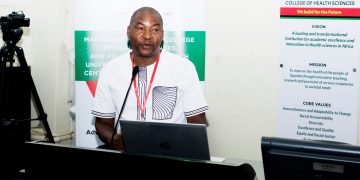Dr. Oyoo Charles Akiya, the Commissioner of Health Services-NCD Ministry of Health, has revealed that the burden of non-communicable diseases (NCDs) in Uganda, has more than doubled in the last 20 years.
Dr Akiya says that 22% of adults in Uganda are at risk of premature death due to NCDs.
He made the remarks at a symposium hosted by Makerere University, on the growing burden of non-communicable diseases (NCDs).
The symposium was held in response to the increasing prevalence of NCDs in the country, which now accounts for 41% of all deaths.
Dr Akiya was represented by Dr Frank Mugabe who cited several studies that highlighted the major risk factors for NCDs in Uganda.
These include heavy alcohol consumption, unhealthy diets, tobacco use, physical inactivity, and obesity.
Dr Mugabe also noted that hypertension is prevalent among 24% of adults in Uganda, but only 24.3% receive treatment.
The prevalence of diabetes is estimated at 1.4%, while 8-16% of Ugandans have chronic obstructive pulmonary disease, and 10-20% of school-going children have asthma.
He noted that the prevalence of sickle cell disease is also high in some regions of the country, affecting 1.3% of the population.
At the symposium, researchers and scientists also discussed priority areas for research and training in NCDs.
Dr Mugabe proposed several key areas for further investigation, including diabetes treatment misinformation, sickle cell disease prevention, gastrointestinal cancer prevalence in southwestern Uganda, chronic respiratory diseases and clean energy, mental health service provision, kidney chronic diseases and transplant services, cardiovascular disease awareness and screening, and the cost of road traffic-associated injuries.
The Principal College of Health Sciences, Makerere University-Professor Damalie Nakanjako, stressed the importance of data-driven interventions, knowledge translation, and a multi-sectoral approach in addressing NCDs, and called for more investment in NCD research, collaborations, and regular exercise among children.
She also reiterated Makerere University’s commitment to addressing NCDs through continuous advances in NCD training, research, and community engagement.
Stakeholders at the symposium recognized the need for collaborative efforts to address the growing burden of NCDs in Uganda.
They stressed the importance of preventive programs, increased awareness of cardiovascular disease screening, improved healthcare accessibility and quality, and research into the causes, prevention, and treatment of NCDs.
The symposium emphasized the need for a holistic approach involving the government, private sector, civil society organizations, and academia to achieve a healthier population and a more prosperous country.









